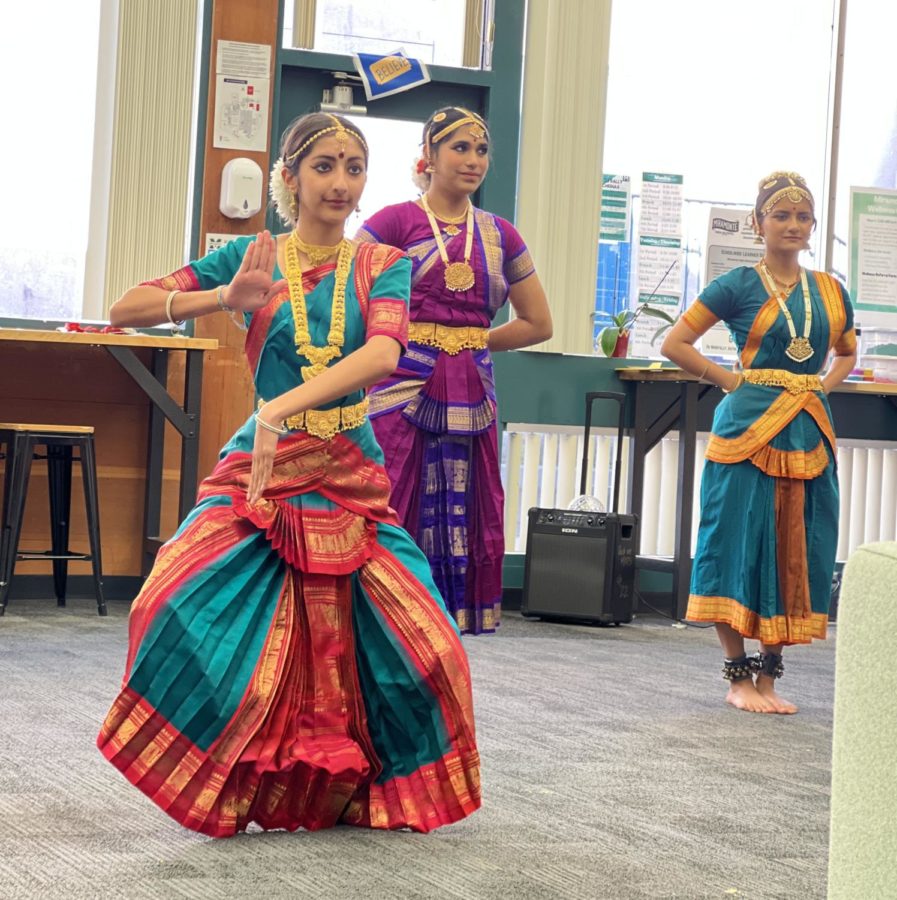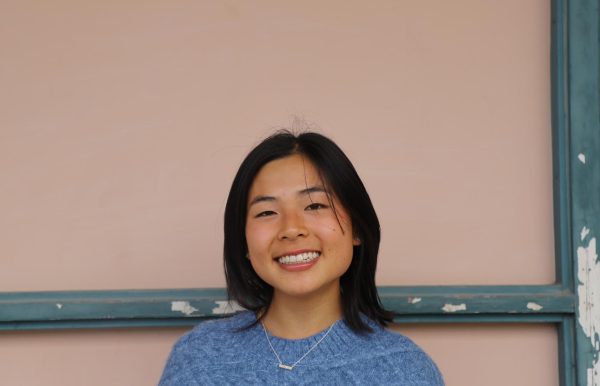Wellness Center Hosts First SSWANA Festival
Students Gia Chhabra and Trisha Prabandham participate in a dance led by the Kalanjali Dances of India group. Photo: Emma Wong
April 18, 2023
Student organizers paved the way for the first district South Asian, Southwest Asian, and North African (SSWANA) Festival at the Wellness Center. The event featured educational posters alongside cultural foods, a traditional Hindu dance performance, and guest speakers.
Key organizers included juniors Leila Maboudian, Selma Ahmed, and senior Nilab Ahmed, officers of the Middle Eastern Student Association, who collaborated and reached out to Leadership and the administration to propose the idea. Senior Gemma Leach worked in Leadership to organize resources to send out to the festival, which happened on Friday, April 14.
“As we were creating the idea for this festival, we had difficulty figuring out how to coordinate with Leadership and Admin … but we were able to bring it all together and incorporate student input. It was really nice seeing the dance groups and the speakers,” Selma said.
The coordinators also encouraged other students to set up educational or entertainment booths at the festival. Advocacy for Immigrants and Refugees (AIR) and the Spanish club presented educational posters, juniors Sana Anand and Cassidy Gustine ran a mehndi/henna stand, and Selma and Nilab Ahmed led a Berber, Arabic, and Persian writing booth.
Almost all stands were accompanied by an array of traditional baked goods and candies originating in the SSWANA region. The snacks included Persian rose water and pistachio nougat (gaz), dried fruit snacks (lavashak), and sugar-coated chickpeas (noql).
“The pistachio biscuits were so good,” sophomore Alise Jensen said. “I really liked the contrast of the pistachio with the chewy and light floral taste of the nougat.”
Later, attendees gathered in the Wellness Center to watch a performance by the Kalanjali Dances of India group, a traditional Hindu dance team headquartered in Berkeley. The act, named Devi Neeye Thunai, was performed in South Indian Bharatanatyam style and revolved around a storyline of the Hindu warrior goddess Meenakshi. Performers dressed in intricately patterned saris–women’s gowns made of woven fabric–which were cut to suit the dancing occasion.
Kalanjali Dances of India is led by instructor Kali Futnani. “I’ve been teaching these students since they were about six or seven,” Futnani said. “After COVID, we’ve been trying to get as many performances as possible because you learn a lot from performing.”
Freshman Trisha Prabandham was one of the six high school performers. “Leila reached out to see if we’d be interested in performing at the festival, and we said yes, 100 percent!” Prabandham said.
Other participants included English teacher Susan McGill, who sat in for the speaker spotlight.
“I love the idea of students supporting each other. Having students attend different cultural events is important,” McGill said. “It educates [and keeps students] continuously learning about other cultures, languages, and artistic expressions.”
After the performance, two guest speakers, consumer marketer Avantika Prabhakara and Reiki master teacher Ani Sekhon, arrived to share their personal experience as members of the SSWANA community, their careers, and where these identities intersected.
“We didn’t have any [South Asian students] where I grew up. So here I was, coming to LA to live there for 16 years, and it was a super diverse place,” Sekhon said of her formative years. “It was really amazing to find the number of South Asians in the area and to have that community.”
“I think there is such beauty when people come together to learn about their culture,” Sekhon said. “When there’s a group of people, you start feeling a force. In being in a community, you understand each other on a deep and cultural level.”
The event’s coordinators hope it serves as an opportunity to celebrate SSWANA heritage and culture.
“It’s important to have these diverse perspectives, especially in the Lamorinda community,” Nilab said. “Hosting these festivals brings to light perspectives and stories from people who attendants might not otherwise have been able to connect with. We’d love to do it again.”








